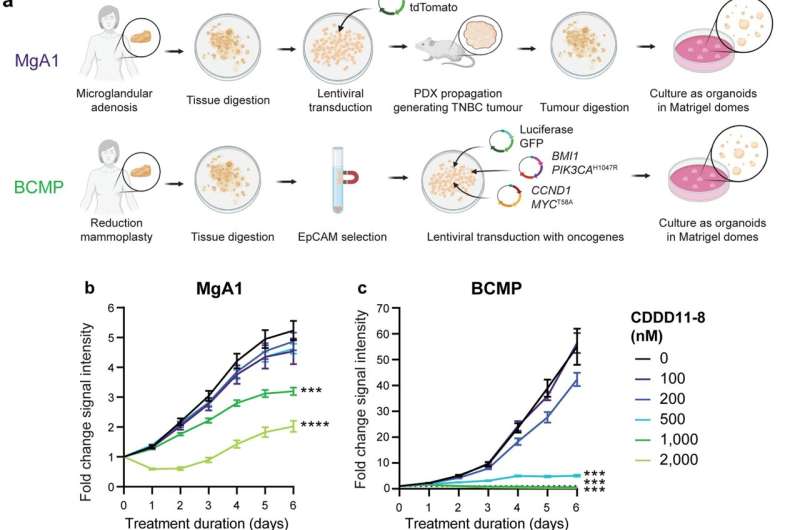This article has been reviewed according to Science X's editorial process and policies. Editors have highlighted the following attributes while ensuring the content's credibility:
fact-checked
trusted source
proofread
New drug halts growth of aggressive breast cancer in pre-clinical study

A promising drug could lead to a new treatment for the most aggressive form of breast cancer, which affects thousands of women each year. A pre-clinical study led by the University of Adelaide found the new drug successfully inhibits the growth of triple negative breast cancer without any toxic side effects.
"This is an exciting development in the battle against triple negative breast cancer, which is the most aggressive form of the disease," said Associate Professor Theresa Hickey, an internationally recognized breast cancer expert at the University of Adelaide's Dame Roma Mitchell Cancer Research Laboratories.
"There is currently no treatment that specifically targets this type of breast cancer, with chemotherapy and, in some women, immunotherapy being the only options. The results of this study show that this drug could hold the key to improving survival rates."
The drug is designed to be taken orally and works by targeting a specific protein in the cancerous tumor called CDK9, which speeds up cell growth. By inhibiting this protein, it effectively stops cancer in its tracks.
"Our pre-clinical study shows that the drug was able to stop the tumor cells from multiplying but did not affect the normal cells in breast tissue taken from patients. It is still early days but based on this initial evidence, we believe inhibiting this protein could lead to a treatment for triple negative breast cancer and this new drug should be developed further," said Associate Professor Hickey.
The collaborative study published in Oncogene also involved Professor Shudong Wang at the University of South Australia, who developed the drug (CDDD11-8) for the treatment of acute myeloid leukemia.
"We've developed CDDD11-8 as a potent, selective, and orally bioactive CDK9 inhibitor for cancer therapy. We are very excited about its therapeutical potential against triple negative breast cancer shown by Associate Professor Hickey," said Professor Wang.
In Australia, approximately 2,500 women are diagnosed with triple negative breast cancer each year. This type of breast cancer occurs more frequently in younger women. It has a higher rate of relapse within five years and a higher mortality rate than other breast cancers during this time.
Researchers hope to identify the biomarkers that predict which triple negative breast cancers will respond best to the inhibitor drug so this can be used to select patients for future trials.
"While this drug is showing promise as a potential treatment for triple negative breast cancer, it needs further development before it can progress to human trials. I'm hopeful this will happen within the next five years, if not sooner," said Associate Professor Hickey.
Researchers also plan to conduct future trials to explore if this potential therapy could be used to treat other types of breast cancer.
"It is imperative that we keep searching for and pre-clinically evaluating targeted therapies for this aggressive disease and improve the outlook for all breast cancer patients," said Associate Professor Hickey.
More information: Ebtihal H. Mustafa et al, Selective inhibition of CDK9 in triple negative breast cancer, Oncogene (2023). DOI: 10.1038/s41388-023-02892-3



















